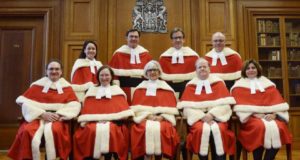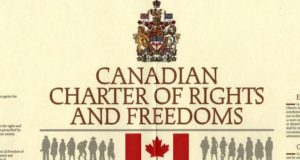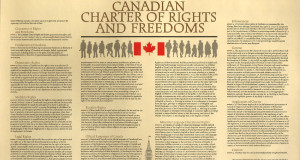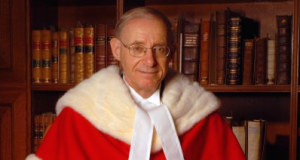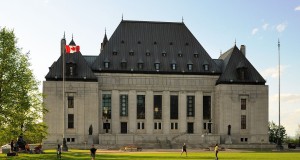This is the secondof two articles Mr. Sirota has written in response to Asher Honickman’s essay entitled “The Case for a Constrained Approach to Section 7.” Mr. Honickman’s reply to follow. This article was originally published at Double Aspect, Mr. Sirota’s award winning blog. As I mentioned in my previous post, I would like to respond to a number of points ...
Read More »Tag Archives: textualism
The Case for a Constrained Approach to Section 7
This article will appear in the upcoming edition of Law Matters, a publication of the Canadian Bar Association Introduction The consensus in the academic community when it comes to interpreting the Charter is that more is better. There is little debate that the Charter is a “living tree,” such that its meaning must “evolve” over time so that it “accommodates ...
Read More »Reviving Originalism in Canada
Originalism posits that the content of a constitution is determined partly by the intentions and purposes of its founders and the understandings of the founding generation. This essay calls for the (re)introduction of originalism, which has an important place in American politics, legal academia, and courts,1 into Canadian constitutional law. First, I explain the importance of the methodology of constitutional ...
Read More »Justice Rothstein Casts Doubt on the Living Tree
I recently learned that, back in October, recently-retired Justice Marshall Rothstein gave a speech at the University of Saskatchewan, in which he criticized the “living tree” doctrine, which holds that the meaning of the Constitution may evolve over time – in most cases, beyond what the text can reasonably bear. The original living tree metaphor comes from the Privy Council’s decision in Edwards ...
Read More »“Clear and Definitive”: The Offence of Bestiality and the Rules of Statutory Interpretation
Last month, the Supreme Court of Canada heard oral arguments in the case R. v. D.L.W. The issue for appeal is not exactly garden variety. The Supreme Court has been asked to determine whether the offence of “bestiality” in the Criminal Code requires penetration. Background The facts are not in dispute and are disturbing to say the least. The accused respondent ...
Read More »Judicial Restraint Lives to Fight Another Day
If laws are supposed to be legislated by the legislature, and interpreted by the judiciary, what happens when the judiciary is of the view that the legislature is dropping the ball? This philosophical conundrum was implicitly considered by two different levels of court in Ontario, with different results. In Ernst & Young Inc. v. Chartis Insurance Co. of Canada, [2014] ...
Read More »The Hard Truth – “the contract said what it said”
MacQuarrie v. National Bank Life Insurance Company is a noteworthy decision for those interested in the “textualist” debate – namely, whether words reduced to writing, whether it be in the form of a policy of insurance, a statute, a commercial contract, or otherwise – should be interpreted according to their plain and ordinary meaning. In MacQuarrie, an insured sought payment ...
Read More »Federal Government Has the Power to Dismantle the Long-Gun Registry and Destroy the Data
Last week, a 5-4 majority of the Supreme Court of Canada held that the federal government is constitutionally permitted to destroy the data it obtained from the former long-gun registry. Quebec (Attorney General) v. Canada (Attorney General) is a classic federalism case that deals with Parliament’s power to regulate criminal law under section 91(27) of the Constitution Act, 1867. In ...
Read More »When Words Apparently Do Not Mean What They Say
Kassburg v. Sun Life Assurance Company of Canada, 2014 ONCA 922, is an Ontario Court of Appeal decision that was released without much fanfare due to the timing of the release (December 29, 2014, right in the middle of the holiday season). Kassburg is worthy of comment, if only for the reason that it is one of the latest ...
Read More »‘Sprite Please’ vs. ‘7Up Se Il Vous Plaît’ – A Distinction Without a (Monetary) Difference
In a widely circulated decision, a 5-2 majority of the Supreme Court of Canada ruled on October 28, 2014 that an Ottawa couple was not entitled to financial compensation for Air Canada failing to provided services in French. Affidavit evidence that was before the court noted that Lynda Thibodeau asked in French for a 7Up, but the unilingual English-speaking flight ...
Read More » Advocates for the Rule of Law
Advocates for the Rule of Law
